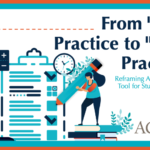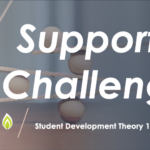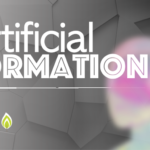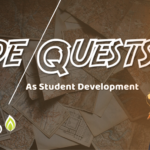![]() This content is brought to you by the Association for Christians in Student Development (ACSD), a volunteer membership organization committed to equipping and challenging faithful professionals to infuse their Christian faith into student development practice and scholarship. Thoughtful content such as this is made possible by volunteer contributions and the financial support of membership dues. Interested in becoming a member for more awesome content just like this? Join today by clicking here!
This content is brought to you by the Association for Christians in Student Development (ACSD), a volunteer membership organization committed to equipping and challenging faithful professionals to infuse their Christian faith into student development practice and scholarship. Thoughtful content such as this is made possible by volunteer contributions and the financial support of membership dues. Interested in becoming a member for more awesome content just like this? Join today by clicking here!
“We want you to have a good life.” These six simple words were said to me by my doctoral dissertation adviser, and they have had a lasting impact on my student career. They were said to me during a particularly difficult time in my life and have helped shape how I think about student affairs for graduate students. Drawing on my own unique doctoral journey over the past four and a half years,I’d like to highlight a few lessons I have learned the hard way that I hope might be helpful to graduate students and those that work with them.
If the ends of Christian higher education are to equip students to order their identities in light of the Christian story (Ream & Glanzer, 2013), then the last four and half years of my life have given me plenty of opportunity to inhabit multiple identities. I arrived in the USA from South Africa in August 2019 to pursue my Ph.D. at Baylor University.It was shortly after that Covid shut down in-person classes, largely challenging my integration to American life. I don’t think I am exaggerating when I say that I went a year without a hug. It was during this time that I also had a cancer scare. More recently, I went from being single to being a husband and dad to three teens and a tween; all of this happened within a six-month period. 10 months into marriage, we were blessed with child number five, and it was during those months that I decided to restart my entire dissertation. It has been a long, crazy, overwhelming season of constant change. Here are three lessons that I have learned and that I will certainly need to relearn along the way:
Lesson 1: Sometimes being a “bad” student is good.
As you can imagine, my progress has not been as quick as I hoped, especially since I got married. However, my husband and father identities are (and should be!) more important than my student identity. There is no doubt that God has called me to be a student, but He has also called me to be a dad and a husband, and these sometimes-conflicting identities need to be ordered correctly. It is not easy to do, and there is the temptation to think that if I was just better at time management then I could do it all. But here is an important lesson when it comes to ordering identities: you must order them simply because you cannot excel in all of them all of the time. To focus on one identity is to take focus off another and that is OK. Sometimes the student identity will be the identity that is deprioritized but that doesn’t make one a bad student if other priorities are rightly ordered.
Lesson 2: Pay attention to your emotions.
Even though I just wrote that it was OK to order identities, it doesn’t always feel OK. We have to be honest that it can be difficult to process and sort through emotions as we embrace the challenges of ordering our identities. In fact, I often felt (and sometimes still do feel) like a failure. Such an admission would be familiar to anyone who has researched doctoral student success. For instance, Anttila et al. (2021) wrote that “the narrative of emotional experiences of doctoral studies is mainly negatively loaded and dominated by pain” (p. 1). It’s a depressing quote and while my journey hasn’t been dominated by pain, it has been a painful one. However, there is great value in reflecting on pain since emotions can point to underlying beliefs about our situations (Pekrun, 2006) and thus provide helpful information if you are willing to listen to them. In my instance, feeling like a failure was arising out of comparison (“my peers are obviously much better than I am at Ph.D. life”) and pride (“I should be able to do everything”). Both of these appraisals are clearly issues to be bought before the Lord.
Lesson 3: Keep it humble.
I have made way too many mistakes when it comes to ordering my identities. There is one identity in particular that I have neglected and that is my identity as an embodied creation. For instance, if you looked at my time usage over the last year, you would see an embarrassingly small amount of time dedicated to exercise. In fact, I’d say that it is a sinfully low amount. But what is the solution to sin? It’s not trying harder, it’s not better management, and it’s not getting a personal trainer. It’s Jesus. I cannot order all the different identities in my own strength, and might I humbly suggest that you cannot either. But I do know that if we seek first His Kingdom, He will give us what we need. The good life, after all, is one lived on our knees.
A Quick Note to Those That Work with Graduate Students
As the above implies, graduate student affairs can be deeply pastoral in nature. One of the challenges of being in a pastoral role, however, is that we can spend so much time pointing others to the Lord that we do neglect our own walks. So, if you’re reading this, I hope that you spend some time with the Lord today. The good student affairs professional is after all, one who spends time on their knees.
References
Anttila, H., Sullanmaa, J., & Pyhältö, K. (2021). Does It Feel the Same? Danish and Finnish Social Science and Humanities Doctoral Students’ Academic Emotions. Frontiers in Education, 6, 758179. https://doi.org/10.3389/feduc.2021.758179
Pekrun, R. (2006). The Control-Value Theory of Achievement Emotions: Assumptions, Corollaries, and Implications for Educational Research and Practice. Educational Psychology Review, 18(4), 315–341. https://doi.org/10.1007/s10648-006-9029-9
Ream, T. C., & Glanzer, P. L. (2013). The idea of a Christian college : A reexamination for today’s university. Cascade Books.







